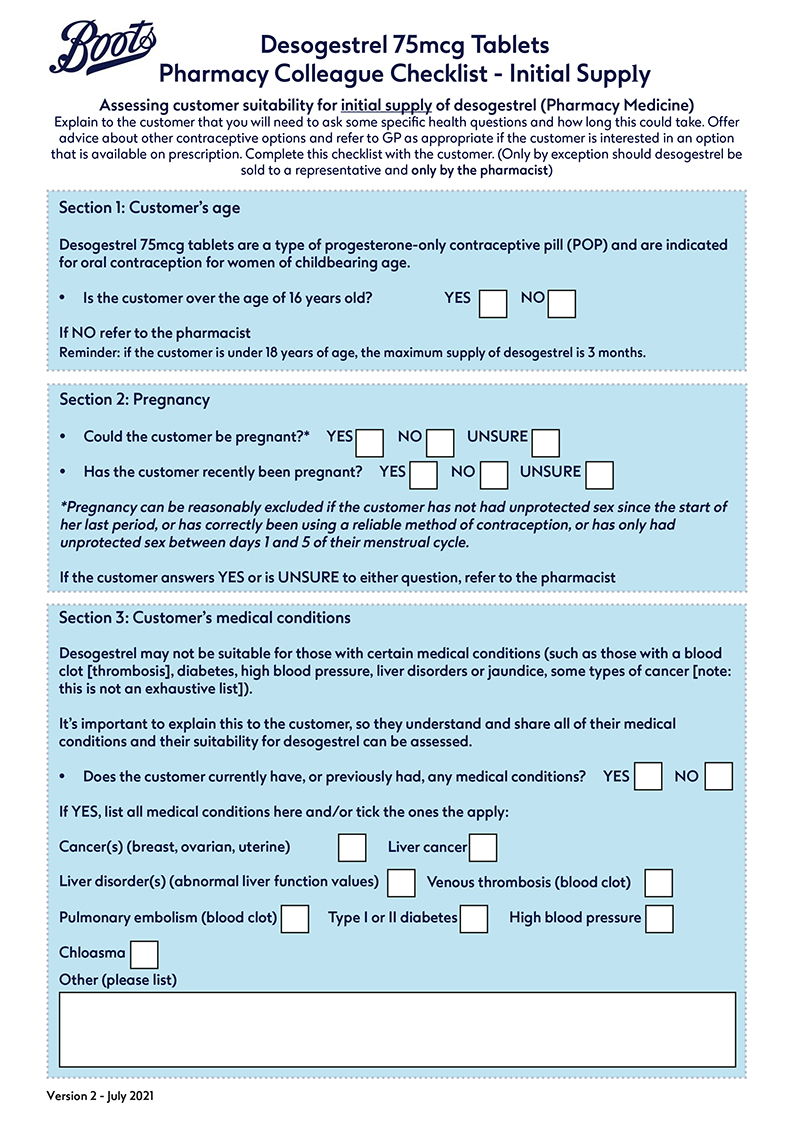ACCESSING CONTRACEPTION
While contraceptives are available free of charge when prescribed from the GP or sexual health clinic, some customers may prefer to purchase contraceptives from the pharmacy due to ease of access. With desogestrel now available as a P medicine, you have the opportunity to supply the most commonly prescribed contraceptive pill,1 which is 99% effective at preventing pregnancy when used optimally, without a prescription or appointment.
Desogestrel works by inhibiting ovulation in up to 97% of cycles. As a secondary effect, it increases the viscosity of cervical mucus, making it difficult for the sperm to reach the egg if ovulation has occurred.
Before checking the suitability of desogestrel for your customer, it is important to check that it meets their contraceptive needs. For example, long-acting reversible contraceptives (LARCs) are considered the most effective contraceptive and condoms are the only contraceptive that protect against sexually transmitted infections (STIs), including HIV. Our Tutor module on Family planning goes into more detail on the different forms of contraception - this is linked at the end of the module for further information.

CONSULTATION
You should use the Pharmacy colleague checklist to aid your consultation.
Click the headings to reveal more information about each section of the checklist.
 Age
Age
Desogestrel is licensed for use in women of childbearing age. However, you should refer all customers under 16 years to the pharmacist who can assess their competency to make a contraceptive choice and explore any safeguarding issues.
 Pregnancy
Pregnancy
It is important to check that the customer could not be pregnant prior to taking desogestrel. Emergency hormonal contraception containing levonorgestrel or ulipristal may be more suitable if the customer has recently had unprotected sex.
NOTE: The advice on when and how to take desogestrel may differ if the customer has recently given birth, had an abortion or miscarried.
 Medical Conditions
Medical Conditions
As always, you should ask your customer about any medical conditions they currently have or have suffered from previously. As an example, some cancers are hormone sensitive, so the risk of taking hormonal contraception might outweigh any benefits. Refer all patients with medical conditions to the pharmacist.
NOTE: Supply is based on known conditions, so you do not need to carry out any checks such as blood pressure or weight.
 Medication
Medication
Many medicines, including some herbal preparations, interact with desogestrel. You should encourage your customer to tell you about any medicines they have taken in the past four weeks. Inform the pharmacist of any medicines the customer is taking.
 Completing The Sale
Completing The Sale
Once the form is complete, show it to your pharmacist and highlight any concerns. If the pharmacist agrees the customer is suitable for desogestrel, then you can complete the transaction while offering some counselling points on how to take the medicine. You should only provide three months' supply in the first instance.
Encourage your customer to notify their GP that they are taking desogestrel.
 Repeat Supply
Repeat Supply
There is a separate checklist to follow for repeat supplies of desogestrel. The checklist will support you to check if desogestrel is still suitable for the customer. Once complete, show the checklist to pharmacist and highlight any changes.
For a repeat supply, up to 12 months' supply can be provided; however, if the customer is under 18 years, they should only ever be given 3 months' supply.
 Counselling Points
Counselling Points
- Advise customers who have not been previously taking hormonal contraceptives to start taking desogestrel on day one of their natural cycle (day one is the first day of menstrual bleeding). If necessary, they can start on days two to five but will need to also use a barrier method during the first seven days of tablet-taking
- Depending on the customer's previous contraceptive and pregnancy history, how they should start taking desogestrel and whether additional contraception is needed will differ. Use the patient leaflet to highlight the appropriate advice
- Advise your customer to take one tablet every day, at the same time each day. If the customer is more than 12 hours late taking a pill, it counts as a missed pill and the customer should check the leaflet/speak to a pharmacist for advice
- Once the customer finishes a pack, they should start the next pack at the same time the next day. No gap should occur between packs, unlike with some other contraceptives
- If the customer suffers from diarrhoea or vomiting within three to four hours of taking their tablet, it should be treated as a missed pill.
